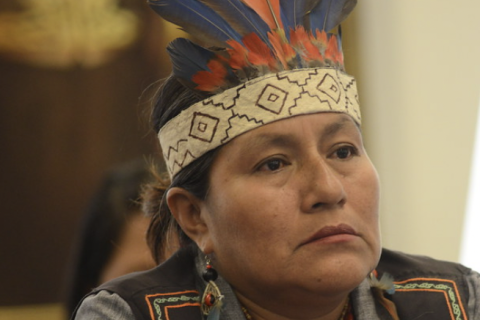ENTRE NORMAS Y REALIDADES: PARADOJAS EN LA PROTECCIÓN DE DERECHOS TERRITORIALES INDÍGENAS EN AMÉRICA LATINA
Por Zulema Burneo
Casi tres décadas atrás, el 9 de agosto fue designado como el Día Internacional de los Pueblos Indígenas por la Asamblea General de las Naciones Unidas. En América Latina, aunque se han logrado avances en el ámbito legal en cuanto a la garantía de sus derechos, basta ver un poco más allá para encontrar serias paradojas que nos obligan a levantar la voz antes que a celebrar el día.
Indigenous Peoples Must be Central to Tackling the Climate Crisis
As leaders from around the globe gather for the 2021 United Nations Climate Change Conference (COP 26), it is vital that they recognize two important facts. The first is that we cannot reach climate goals without protecting and sustainably managing the carbon-absorbing forests that cover a third of the Earth’s land surface.
Indigenous forest tenure: the important role local people play in forest conservation and carbon management
A new data story based on a recent study by the FAO demonstrates how the forests of indigenous and tribal territories in Latin America are key for mitigating climate change and conserving biodiversity.
3rd Mekong Regional Land Forum: Forum Replay
Summaries and selected replays from the 3rd Mekong Regional Land Forum are available below. Full replays of the plenary sessions will be posted shortly -- check back soon!
New guide aims to accelerate forest tenure pathways to gender equality
Forest tenure reform in the global south has often failed to be gender-responsive, but there is increasing interest in taking up this challenge to activate effective change.
Now, a new guide created by scientists with the Center for International Forestry Research (CIFOR) aims to make the process more accessible, recommending a three-step process, billed as “analyze, strategize, and realize,” to support interventions in local and national contexts.
Six tips for Africa’s restoration entrepreneurs
How to get tree planting — and growing — right
This article was originally published by Forests News
Communities, conservation & development in the age of COVID-19: Time for rethinking approaches
The global conservation community now faces the added challenge of Covid-19 on top of a longstanding set of complex conservation, sustainability, and development challenges. In the wake of this pandemic, return to business as usual is not a viable option. The existing systems and structures upon which conservation is based must evolve. Climate change, biodiversity conservation, and poverty elimination efforts have been further complicated by Covid-19, with the brunt of the pandemic borne most acutely by the poorest and most vulnerable.
Closing Data Gaps to Eliminate Deforestation and Land Disputes from Beef Supply Chains in Paraguay
In the last 15 years, Paraguay lost a greater share of its forest than almost any other country on Earth. While soy farming once drove deforestation in the east, the focus of Paraguay's forest loss has since moved west to the low-lying, thorn-forested Chaco, where cattle ranching has claimed over 3.7 million hectares (9 million acres) of forest for pastureland – an area about the size of the Netherlands – between 2001 and 2015.
7 Unexpected Places for Forest Landscape Restoration
By Katie Reytar
This is the second installment of WRI’s blog series, New Perspectives on Restoration. The series aims to share WRI’s views on restoration, dispel myths, and explore restoration opportunities throughout the world.



